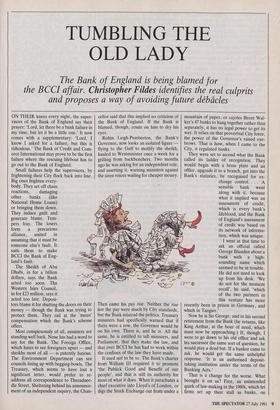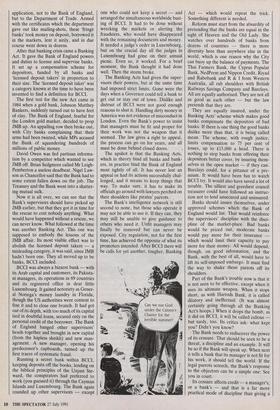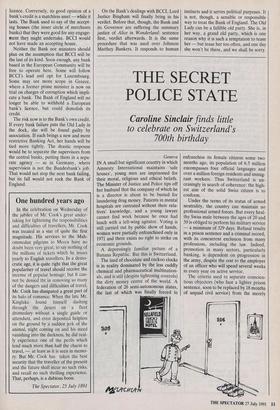TUMBLING THE OLD LADY
The Bank of England is being blamed for and proposes a way of avoiding future debacles
ON THEIR knees every night, the super- visors of the Bank of England say their prayer: 'Lord, let there be a bank failure in my time, but let it be a little one.' It now comes with a supplementary: 'Lord, I know I asked for a failure, but this is ridiculous.' The Bank of Credit and Com- erce International may prove to be the first failure where the rescuing lifeboat has to go out to the Bank of England.
reactions, damaging other banks (like National Home Loans) or bringing them down. They induce guilt and generate blame. Tem- pers fray. The losers form a precarious alliance, united in assuming that it must be someone else's fault. It suits them to make BCCI the Bank of Eng- land's fault.
Most conspicuously of all, ministers are standing well back. None has had a word to say for the Bank. The Foreign Office, which hates to see foreigners upset — and sheikhs most of all — is patently furious. The Environment Department can see councils lining up with begging-bowls. The Treasury, which seems to have lost a significant letter, would prefer to re- address all correspondence to Threadnee- dle Street, Sheltering behind his announce- ment of an independent inquiry, the Chan- cellor said that this implied no criticism of the Bank of England. If the Bank is blamed, though, count on him to dry his eyes. Robin Leigh-Pemberton, the Bank's Governor, now looks an isolated figure flying to the Gulf to mollify the sheikh, hauled to Westminister once a week for a grilling from backbenchers. Two months ago he was asking for an independent role, and asserting it, warning ministers against the siren voices wailing for cheaper money.
Then came his pay rise. Neither the rise nor the pay were much by City standards, but the Bank misread the politics. Treasury ministers had specifically warned that if there were a row, the Governor would be on his own. There is, and he is. All the same, he is entitled to tell ministers, and Parliament, that they make the law, and that over BCCI he has had to work within the confines of the law they have made.
It used not to be so. The Bank's charter from William III required it to promote `the Publick Good and Benefit of our people', and that is still its authority for most of what it does. When it parachutes a chief executive into Lloyd's of London, or digs the Stock Exchange out from under a mountain of paper, or cajoles Brent Wal- ker's 47 banks to hang together rather than separately, it has no legal power to get its way. It relies on that proverbial City force, the power of the Governor's raised eye- brows. That is how, when I came to the City, it regulated banks.
I went at that time to ask an official called George Blunden about a bank with a high- sounding name which seemed to be in trouble. He did not need to look up from his desk. 'We do not for the moment recall', he said, 'which of the two partners in this venture has more recently been in prison in Germany, and which in Tangier.'
Now he is Sir George, and in his second retirement from the Bank (he returns, like King Arthur, at the hour of need, which must now be approaching.) If, though, I were to go down to his old office and ask his successor the same sort of question, he would play a dead bat. If a banker came to ask, he would get the same unhelpful response. 'It is an authorised deposit- taking institution under the terms of the Banking Acts.'
That is a change for the worse. What brought it on us? First, an unintended quirk of law-making in the 1960s, which let firms set up their stall as banks, on application, not to the Bank of England, but to the Department of Trade. Armed with the certificates which the department gave out like mailing-shots, these 'fringe banks' took money on deposit, borrowed it in the markets, lent it airily, and in due course went down in dozens.
After that banking crisis came a Banking Act. It gave the Bank of England powers and duties to license and supervise banks. It set up a compensation scheme for depositors, funded by all banks and `licensed deposit takers' in proportion to their size. The 'licensed deposit taker' was a category known at the time to have been invented to find a definition for BCCI.
The first test for the new Act came in 1984 when a gold bank, Johnson Matthey Bankers, suddenly turned out to have feet of clay. The Bank of England, fearful for the London gold market, decided to prop JMB up. An appalling row then broke out, with City banks complaining that their arms had been twisted, while MPs accused the Bank of squandering hundreds of millions of public money.
David Owen was fed partisan informa- tion by a competitor which wanted to see JMB off. Brian Sedgmore called Mr Leigh- Pemberton a useless deadbeat. Nigel Law- son as Chancellor said that the Bank had to some extent fallen down on the job. The Treasury and the Bank went into a shatter- ing mutual sulk.
Now it is all over, we can see that the Bank's supervisors should have picked up JMB earlier, but that they got it in time for the rescue to cost nobody anything. What would have happened without a rescue, we can never know. What followed at the time was another Banking Act. This one was supposed to embody the lessons of the JMB affair. Its most visible effect was to abolish the licensed deposit takers — a misleading category, it was said, since JMB hadn't been one. They all moved up to be banks, BCCI included.
BCCI was always a bizarre bank — with its Arab capital and customers, its Pakista- ni managers, its operations in 69 countries and its registered office in dear little Luxembourg. It gained notoriety as Gener- al Noriega's money laundry in Florida, though the US authorities were content to fine it and to close one branch. It had got out of its depth, with too much of its capital tied in doubtful loans, secured only on the personal credit of the borrower. The Bank of England banged other supervisors' heads together and brought in new capital (from the hapless sheikh) and new man- agement. A new manager, opening his predecessor's cupboards, turned up the first traces of systematic fraud.
Running a secret bank within BCCI, keeping deposits off the books, lending on the biblical principles of the Unjust Ste- ward, the conspirators had preferred to work (you guessed it) through the Cayman Islands and Luxembourg. The Bank again rounded up other supervisors — except one who could not keep a secret — and arranged the simultaneous worldwide bust- ing of BCCI. It had to be done without wrecking the markets or alerting the fraudsters, who would have disappeared with the remaining documents and money. It needed a judge's order in Luxembourg, but on the crucial day all the judges in Luxembourg had gone on their annual picnic. Even so, it worked. For a brief moment, the Bank thought it had done well. Then the storm broke.
The Banking Acts had given the super- visors their powers, but at the same time had imposed strict limits. Gone were the days when a Governor could tell a bank to get out or stay out of town. Dislike and distrust of BCCI were not good enough reasons to shut it. Handling dirty money in America was not evidence of misconduct in London. Even the Bank's power to insist that managers must be fit and proper for their work was not the weapon that it seemed. The law gives a right to appeal, the process can go on for years, and all must be done behind closed doors.
The upshot is that the Banking Acts, which in theory bind all banks and bank- ers, in practice bind the Bank of England most tightly of all. It has never lost an appeal or had its actions successfully chal- lenged, and it means to keep things that way. To make sure, it has to make its officials go around with lawyers perched on their shoulders like pirates' parrots.
The Bank's intelligence network is still second to none, but those who operate it may not be able to use it. If they can, they may still be unable to give guidance to others who need it. Unfit managers may finally be removed but can never be exposed. City regulation, not for the first time, has achieved the opposite of what its promoters intended. After BCCI there will be calls for yet another, tougher, Banking Act — which would repeat the trick. Something different is needed.
Reform must start from the absurdity of pretending that the banks are equal in the sight of Heaven and the Old Lady. She watches over hundreds of banks from dozens of countries — there is more diversity here than anywhere else in the world, which is one reason why the City can buoy up the balance of payments. The Thai Farmers Bank, the Cyprus Popular Bank, NedPerm and Nippon Credit, Riyad and Rabobank and R & I from Western Australia, all rub shoulders with British Railways Savings Company and Barclays. All are equally authorised. They are not all as good as each other — but the law pretends that they are.
They are equally insured, under the Banking Acts' scheme which makes good banks compensate the depositors of bad banks. If there is one thing the good banks dislike more than that, it is being called mean. The scheme, with rough justice, limits compensation to 75 per cent of losses, up to £15,000 a head. There is nothing to stop banks from offering their depositors better cover, by insuring them- selves in the open market — if they can. Barclays could, for a pittance of a pre- mium. It would have been fun to watch BCCI try. It would also have saved a lot of trouble. The silliest and greediest council treasurer could have followed an instruc- tion not to lend unsecured and uninsured.
Banks should insure themselves, under approved schemes which the Bank of England would list. That would reinforce the supervisors' discipline with the disci- pline of the market-place. Bad banks would be priced out, moderate banks would pay more for their insurance which would limit their capacity to pay more for their money. All would depend, though, on good information, and the Bank, with the best of all, would have to lift its self-imposed embargo. It must find the way to shake those parrots off its shoulders.
Part of the Bank's trouble now is that it is not seen to be effective, except when it uses its ultimate weapon. When it stops short, as with Harrods Bank, it is called dilatory and ineffectual. (It was almost certainly going through all the Banking Act's hoops.) When it drops the bomb, as it did on BCCI, it will be called callous but tardy, too. Its critics ask: what kept you? Didn't you know?
The Bank needs to rediscover the power of its censure. That should be seen to be a threat, a discipline and an example. It will be so if the Bank will speak up. When next it tells a bank that its manager is not fit for his work, it should tell the world. If the legal parrots screech, the Bank's response to the objectors can be a simple one: See you in court.
Its censure affects credit — a manager's, or a bank's — and that is a far more practical mode of discipline than giving a licence. Conversely, its good opinion of a bank's credit is a matchless asset — while it lasts. The Bank used to say of the accept- ing houses (the inner circle of merchants banks) that they were good for any engage- ment they might undertake. BCCI would not have made an accepting house.
Neither the Bank nor ministers should plan on the assumption that BCCI will be the last of its kind. Soon enough, any bank based in the European Community will be free to operate here. Some will follow BCCI's lead and opt for Luxembourg. Some may see more scope in Greece, where a former prime minister is now on trial on charges of corruption which impli- cate a bank. The Bank of England will no longer be able to withhold a European bank's licence, but could demolish its credit.
The risk now is to the Bank's own credit. If every bank failure puts the Old Lady in the dock, she will be found guilty by association. If each brings a new and more restrictive Banking Act, her hands will be tied more tightly. The drastic response would be to separate the supervisors from the central banks, putting them in a sepa- rate agency — as in Germany, where supervision is not the Bundesbank's job. That would not stop the next bank failing, but its fall would not rock the Bank of England.
On the Bank's dealings with BCCI, Lord Justice Bingham will finally bring in his verdict. Before that, though, the Bank and its Governor are suffering the summary justice of Alice in Wonderland: sentence first, verdict afterwards. It is the same procedure that was used over Johnson Matthey Bankers. It responds to human
instincts and it serves political purposes. It is not, though, a sensible or responsible way to treat the Bank of England. The Old Lady can be a fallible old party. She is, in her way, a grand old party, which is one reason why it is such a temptation to tease her — but tease her too often, and one day she won't be there, and we shall be sorry.




















































 Previous page
Previous page